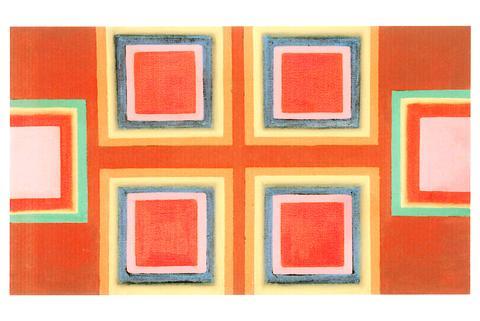Walking around the geometric abstraction exhibition at the Taipei Fine Arts Museum, one explores the varieties of Taiwanese abstract art, as well as examining the melding of Western concepts with Eastern philosophy that created a unique movement in Taiwan.
The Lyricism of Form: Geometric Abstraction highlights more than 50 pieces from 14 Taiwanese artists and spans the history of the movement in Taiwan from its onset in the 1960s to the present day.

Near the entrance of the exhibition is Chen Shiu-ming's (
Hu Kun-jung's (
Artists such as Richard Lin (
Images of folk art are also rich in Shiy De Jinn's (
From a postmodern perspective, Chang Cheng-jen (
When viewed as a whole, there doesn't seem to be a common thread underlining the exhibit, nor is it arranged in any particular order, chronological or otherwise. It does, however, examine the numerous influences -- both Western and Chinese -- that lead to a variegated abstract movement in Taiwan. The exhibit also provides an impressive overview of the group of artists who constructed the movement.
Equally interesting is how these pieces, which were originally influenced by works from the late 19th century, have become commonplace, mass-produced interior designs in bars, clubs and local homeware stores around the globe.
Exhibition notes:
What: The Lyricism of Form: Geometric Abstraction
Where: Taipei Fine Arts Museum (台北市立美術館) 181 Zhongshan N Rd, Sec 3, Taipei (臺北市中山北路3段181號).
Telephone: (02) 2595 7656
When: Until Oct. 10, Tuesday to Sunday from 9:30am to 5:30pm. Closed on Mondays

As Taiwan’s second most populous city, Taichung looms large in the electoral map. Taiwanese political commentators describe it — along with neighboring Changhua County — as Taiwan’s “swing states” (搖擺州), which is a curious direct borrowing from American election terminology. In the early post-Martial Law era, Taichung was referred to as a “desert of democracy” because while the Democratic Progressive Party (DPP) was winning elections in the north and south, Taichung remained staunchly loyal to the Chinese Nationalist Party (KMT). That changed over time, but in both Changhua and Taichung, the DPP still suffers from a “one-term curse,” with the

Jan. 26 to Feb. 1 Nearly 90 years after it was last recorded, the Basay language was taught in a classroom for the first time in September last year. Over the following three months, students learned its sounds along with the customs and folktales of the Ketagalan people, who once spoke it across northern Taiwan. Although each Ketagalan settlement had its own language, Basay functioned as a common trade language. By the late 19th century, it had largely fallen out of daily use as speakers shifted to Hoklo (commonly known as Taiwanese), surviving only in fragments remembered by the elderly. In

William Liu (劉家君) moved to Kaohsiung from Nantou to live with his boyfriend Reg Hong (洪嘉佑). “In Nantou, people do not support gay rights at all and never even talk about it. Living here made me optimistic and made me realize how much I can express myself,” Liu tells the Taipei Times. Hong and his friend Cony Hsieh (謝昀希) are both active in several LGBT groups and organizations in Kaohsiung. They were among the people behind the city’s 16th Pride event in November last year, which gathered over 35,000 people. Along with others, they clearly see Kaohsiung as the nexus of LGBT rights.

In the American west, “it is said, water flows upwards towards money,” wrote Marc Reisner in one of the most compelling books on public policy ever written, Cadillac Desert. As Americans failed to overcome the West’s water scarcity with hard work and private capital, the Federal government came to the rescue. As Reisner describes: “the American West quietly became the first and most durable example of the modern welfare state.” In Taiwan, the money toward which water flows upwards is the high tech industry, particularly the chip powerhouse Taiwan Semiconductor Manufacturing Co (TSMC, 台積電). Typically articles on TSMC’s water demand